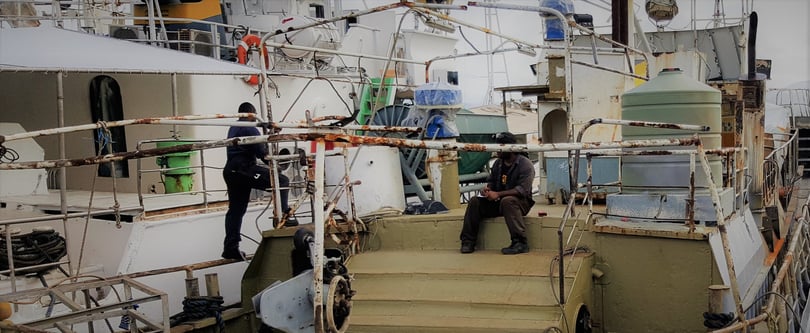Commercial fishing provides an inherently challenging and sometimes hazardous work environment. Workers carry out their duties on a moving, wet, slippery platform surrounded by heavy machinery and the ocean. They are frequently far from home, required to undertake physical work over long hours, low on resources and without adequate legal and medical protections that many of us would take for granted.
While the concerns and issues that beset working conditions aboard commercial fishing vessels are well known there are significant complexities to the adoption of legally enforced minimum standards because of the cross-border nature of fishing and various issues related to sovereignty of maritime spaces and flagged vessels. However, if a way can be found to get through these complexities there would be significant advantages for the governance of the fishing industry to have accepted minimum employment standards.
In this bulletin we consider the impacts that the International Labour Organisation’s Work in Fishing Convention ILO Convention C.188 (“ILO Convention 188”) may have on the commercial fishing industry as it enters into effect in November 2017.
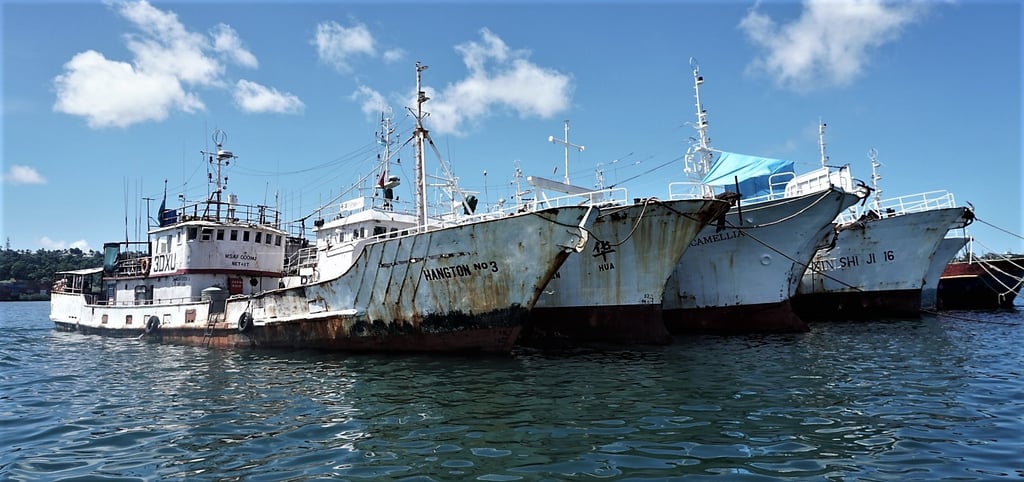
Commercial fishing boats in Suva habour April 2017
Advantages of regulation of working conditions aboard commercial fishing vessels
The commercial value of the global tuna stock at the point of sale is approximately US$42 billion per annum with more than 50 percent of the World’s tuna catch coming from the western and central Pacific. In 2014 the catch of commercial tuna from the western and central Pacific made more than US$22 billion at the point of sale of which US$5 billion went to fishermen.[1]
Given the global demand for fish and tuna in particular, and the high value of the Pacific’s commercial fishing stocks, good regulation/management of the fishing industry is essential to protect the long term interests of the Pacific Islands, their people and fisheries resources.
Sadly, the overall picture is not always a good one with fishing pressures already leading to some species collapse, notably the Pacific bluefin, with many other species overfished. In addition, the Pacific region is not realising as much value as it should from its fishing resources. Significant issues include the use of labour from outside the region which not only sends money out of the region but it also distorts the market for commercial fishing vessels from the Pacific. Further, the Pacific Islands are at a natural disadvantage due to the high processing costs within the Pacific Islands which mean that they cannot compete with the processing centers in places like the Philippines and Vietnam.
A significant part of addressing the issues with the commercial fishing industry involves the regulation of the commercial fishing operators to ensure that they abide by the “rules of the game” set by the region’s regulators. This applies as much to sustainable fishing practices as to guaranteeing fair or minimum labour standards aboard their vessels. If commercial fishing vessels are prepared to implement fair working standards this would signal operators that are prepared to follow the rules and it would make their operations more attractive to Pacific Islanders. Significantly, if more Pacific Islanders are employed with decent working conditions more of the benefits of the harvesting of the Pacific’s fishing resources will remain in the region and this would increase opportunities for advancement for young and skilled workers.
Getting this right would also lead to other benefits including: reducing unfair competition while promoting a culture of regulatory compliance within the commercial fishing industry. While there will remain those operators that are likely to continue to try to evade control, as with IUU, there are compelling economic reasons why minimum standards and compliance is good for the commercial fishing industry in general and Pacific Islands in particular.
Current international framework inadequate / ineffective
Unfortunately, the existing international framework for regulating the working conditions on board commercial fishing vessels and for guaranteeing or upholding workers’ rights is ineffective.
Currently there are no adopted minimum standards that apply across the commercial fishing industry and this means that all workers aboard fishing vessels including Pacific Island workers are at the mercy of the operators of the commercial fishing vessel regarding their worker’s rights. Due to the nature of commercial fishing operations the owner of the commercial fishing vessel is also the employer, but the owner is unlikely to be on board, and the skipper has delegated authority to act for the owner and should share responsibility with the vessel owner for the safety of the vessel and crew.
As a result workers risk being denied the most basic workers’ rights including: being in an employment relationship (many workers are categorised as informal or self-employed), being provided with a written employment agreement, receiving a minimum wage, being made to only work for a maximum number of hours, and being provided with a safe working environment.
ILO Convention
In response, the International Labour Organisation (ILO) has created the ILO Work in Fishing Convention also known as the ILO Convention C.188 (ILO Convention). The ILO Convention will come into force in November 2017 and it applies to all workers and defines fishermen widely to include everyone involved in the fishing industry whether employed or self-employed and applies to fishing vessels engaged in commercial fishing operations regardless of the ownership of the vessel. The objectives of this Convention are to provide an attractive and safe working environment for workers by ensuring decent living and working conditions by setting out global minimum requirements.
The standards set out in the ILO Convention represent a set of minimum standards for workers on commercial fishing vessels. While the standards frequently comply with employment standards that are guaranteed by national laws like Fiji’s for example, the ILO standards go further in that they anticipate and tailor the standards specifically to the commercial fishing industry.
The specific issues, conditions and workers’ rights that the ILO Convention addresses includes:
- Risk assessment of vessel by owner/skipper. The ILO Convention provides that risk evaluation shall be conducted, as appropriate, with the participation of workers or their representatives.
- Minimum age requirement for workers. The ILO Convention provides the minimum age for working on a fishing vessel is 16 years of age with limited exceptions from the competent authority for 15 year olds, and no night fishing for under 18s.
- Medical certificate required from all workers. The ILO Convention obliges all workers to have a medical certificate before being admitted to work on a fishing vessel. The certificate must state that the worker does not suffer from any condition which would be aggravated by working at sea or which would endanger the safety and health of others on the vessel. Eyesight and hearing tests required.
- Working hours/limit for workers. The ILO Convention provides that for all vessels at sea for more than 3 days there are limits on hours of rest and hours of work for the purpose of the protection of safety and health of workers and for limiting fatigue. Emergency situations can enable skipper to override. Working hours are set by average working week/12 month period, maximum work hours per 24 hours, maximum work hours per 7 day period.
- Written employment agreement. The ILO Convention provides that every worker have a written agreement that is comprehensible to them and provides for decent living and working conditions. This should set out certain compulsory information including: names of employer/employee, the capacity the worker is going to work in, number of voyages hired for, place of joining the ship, wage, paid annual leave, social security, compensation in case of sickness, injury or death, medical coverage and right to repatriation. Agreement must be carried on vessel.
- Repatriation for workers whose employment contract has expired or is terminated or worker is incapable of carrying out duties. The ILO Convention provides right of repatriation when fishing vessel enters port at cost of vessel owner.
- Adequate food and water on vessel. The ILO Convention provides that food carried and served on board be of a sufficient nutritional value, quality and quantity. Potable water must be of sufficient quality and quantity.
- Right to medical treatment on board and ashore. The ILO Convention provides rights for workers to receive medical treatment ashore as well as to be taken ashore for medical treatment in a timely manner in case of serious injury or disease.
- Protection in case of work-related injury sickness and death. The ILO Convention ensures that in case of a work-related injury, or sickness, the worker must have the right to appropriate medical care and when the worker suffers work related disease, injury or death, the worker or the worker’s descendants have the right to compensation. If the national social security system does not provide for it, the fishing vessel owner is responsible for the protection and medical care of the worker while on board of the vessel or in a foreign port until he is repatriated.
Will the ILO Convention guarantee workers rights on commercial fishing vessels in the Pacific?
If, commercial fishing vessels operated in accordance with the standards set out in the ILO Convention it would represent a quantum leap forward in terms of workers’ rights in the commercial fishing industry in the Pacific and as a result working in the industry would become more attractive and secure for Pacific islanders working in the industry. This would benefit not just the worker but also the families of workers who would be provided with more security.
However, before workers in Pacific Islands can enjoy the minimum standards set out in the ILO Convention, there are some legal and practical blockages that will need to be cleared. This includes:
- Pacific Island State’s ratifying the ILO Convention and aligning their national laws with it (where required)
- How to regulate compliance with the minimum standards set out in the ILO Convention and employment law in particular
We address each of these issues in turn.
Ratifying the ILO Convention
In accordance with the normal practice of international law, any State which signs up to the Convention must still adopt the legislation that updates their laws to align with the ILO Convention. Questions remain whether Pacific Island States will adopt the ILO Convention because there is a practical concern that the conditions of the ILO Convention will be too onerous for many States.
Mitigating against this obstacle is the fact that throughout the Pacific Islands, governments have been updating their legislation and adopting minimum statutory standards for their workers. In Fiji, for example, many of the minimum standards set out in the ILO Convention are already guaranteed for workers, although of course specific issues like checking the seaworthiness of the vessel itself, or meeting repatriation expenses are not required, and disputes still exist in relation to questions like the appropriate level for a national minimum wage.
Practical and legal questions regulating the commercial fishing industry
By its nature, the commercial fishing industry presents a number of obstacles that make prescribing and regulating labour standards inherently challenging, particularly for developing States and the regulation of vessels flagged to a foreign jurisdiction.
This is because the fishing operators themselves may originate from what are known here, in the western and central Pacific region as: distant water fishing nations (DWFNs). DWFNs operating in the western and central Pacific include: Indonesia, Japan, Taiwan, China, United States, Korea, and Japan.
The international legal framework that regulates commercial fishing vessels adds another layer of complexity because vessels and crew may originate from one of these DWFNs, but may be registered (flagged) to a third State, under a practice known as “flags of convenience”. Pursuant to international law the flag State has primary responsibility for regulating the fishing vessel with only limited exceptions to the flag State’s exclusive jurisdiction, and these exceptions do not include regulating labour standards. The lack of legal jurisdiction over the vessels of DWFNs leads directly to vulnerable workers and is linked to human rights abuses at sea. We address this topic more in a previous piece Human Rights Abuses and Fisheries - an international law problem
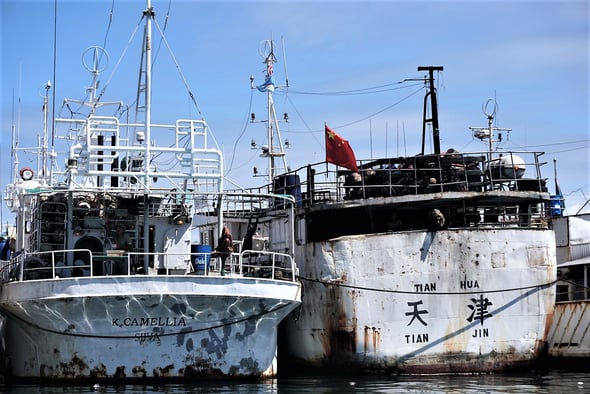
commercial fishing boats in Suva harbour, April 2017
There may be ways around this international law question of exclusive jurisdiction. For example, New Zealand has taken the approach of requiring vessels that it licences to fish within NZ waters to re-flag to New Zealand to provide New Zealand with jurisdiction to regulate the commercial fishing vessels in accordance with NZ law which includes employment law requirements. However, this novel solution does not address the question of providing more opportunities to Pacific island workers, and questions remain whether Pacific islands have the required resources to regulate foreign fishing vessels that New Zealand has.
In this context, what can Pacific island States do to provide more attractive working conditions and secure more employment?
For practical and legal reasons, if the Pacific States of the western and central Pacific want to provide attractive working conditions while providing more employment opportunities for Pacific Islanders then further consideration should be given to how Pacific island States can co-operate to set the rules of the game by prescribing and enforcing labour and other regulatory standards.
A starting point could be agreement within the western and central Pacific States to ratify the ILO Convention and align their legislation to meet the minimum labour standards within the ILO Convention This would include minimum legal requirement for:
- an employment agreement
- minimum wages / wage security
- maximum hours of work
- adequate accommodation and food
- a safe working environment
- insurance in case of accident or death.
While a common agreed minimum standard amongst Pacific Island States could be enforced against any commercial fishing vessel flying a Pacific Nations flag, this could make it harder for these commercial fishing operators to compete, and push to more “reflagging”.
For this reason, as well as common agreed terms a commercial law approach may assist by putting forward policy mechanisms designed to blend a “stick and carrot” approach to incentivise all commercial fishing operators to comply. A range of commercial policy mechanisms that could assist include:
- Working closely with major markets like the EU whose importance as an importer enables it to set standards that influence production and processes within the commercial fishing industry and attempting to get the EU to preferentially purchase with fish caught by commercial fishing operators that guarantee minimum workers’ rights.
- Utilising Port State measures to enable Pacific Island States to inspect vessels for safety and worker’s rights.
- Consider whether it would be sensible/practical to follow New Zealand’s example and request that all DWFNs, regardless of where they are currently flagged, re-flag to the jurisdiction in which they are fishing, enabling jurisdiction to enforce the minimum labour standards applicable to all Pacific Island States following ratification and implementation of the ILO Convention.
- Consider making it a condition of a commercial fishing licence that:
- the fishing vessel must employ a certain quota or percentage of workers from the Pacific Islands in accordance with the ILO Convention’s minimum standards.
- a waiver is provided by the commercial fishing vessel’s owners to the exclusive regulatory jurisdiction of their flag State and a voluntary submission to the jurisdiction of the Pacific Island (including in relation to labour laws) in which waters they are undertaking commercial fishing.
- Consider whether fish caught for or sold in the Pacific Islands market could be purchased at a more favourable price for commercial fishing vessels that comply with the ILO Convention standards.
- Consider restricting fishing licences to fishing companies (DWFN or Pacific based) that are able to demonstrate compliance with the minimum standards.
- Consider suitable intelligence gathering processes to collect information from crew members through a requirement to interview crew members on their return from any fishing venture.
In addition to the above, it will be important to determine which Regional Fisheries Management Organisations (RFMOs) will guide the region wide policy and how they coordinate existing strategies with each other.
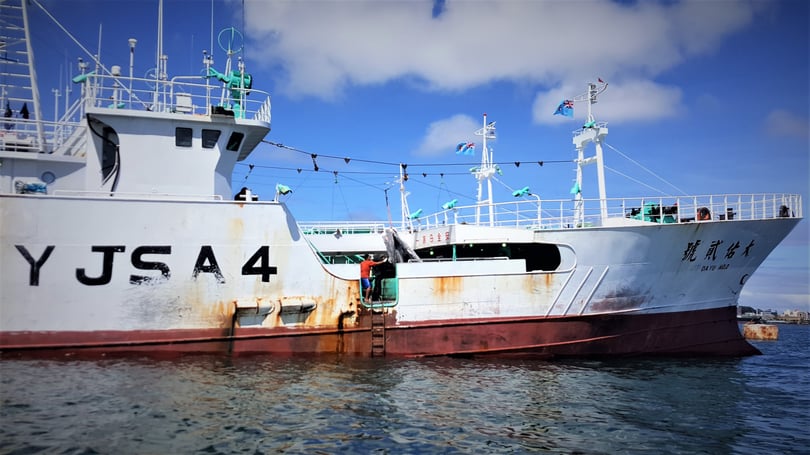
[commercial fishermen in Suva harbour, April 2017]
Conclusions
There is a link between IUU and labour law breaches. The most significant human rights and labour breaches tend to arise from illegal fishing operators and this means the issue of getting the governance of the industry is tied to IUU and Port State Measures [2]. In relation to IUU as with any environmental problems: there is no single simple answer and any solution involves a whole host of complementing policies that work together to eradicate a common problem at various levels and locations.
The ILO Convention represents an opportunity for Pacific Island States with the assistance of RFMOs to adopt a set of agreed minimum standards across the commercial fishing industry. However, there is a risk that ratifying and adopting the minimum standards in the ILO Convention will not lead to greater involvement of Pacific Island workers as DWFNs attempt to utilise workers from outside the Pacific region and evade or avoid regulatory oversight by relying on flag State “immunity”. If this does happen it will sadly continue the trend that sees the Pacific Island States not receive their fair share from their important renewable natural resources with the consequent disincentive to manage the resources sustainably.
It will therefore be necessary for Pacific Island States to work together to agree a range of licensing and other controls to force commercial fishing operators who want to catch western and central Pacific tuna and other fish to meet minimum labour standards for the benefit of the workers, their families, the resources and the future development of Pacific Island States.
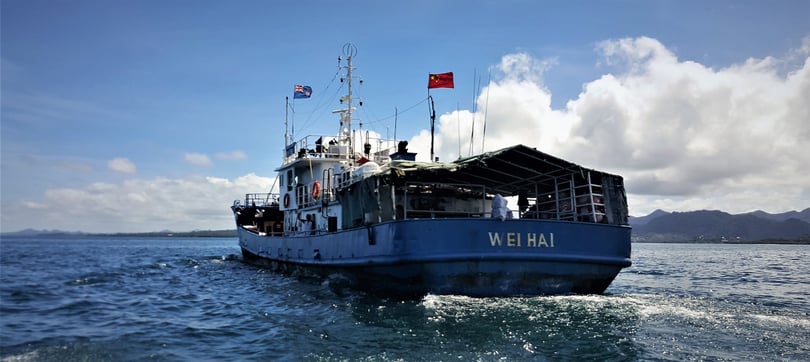
[commercial fishing boat, heading out to sea from Suva harbour, April 2017]
References:
[2] http://www.fao.org/news/story/en/item/453811/icode/
Please note:
This legal bulletin is provided for general information purposes only and it is not, and should not be relied on as, legal advice.
